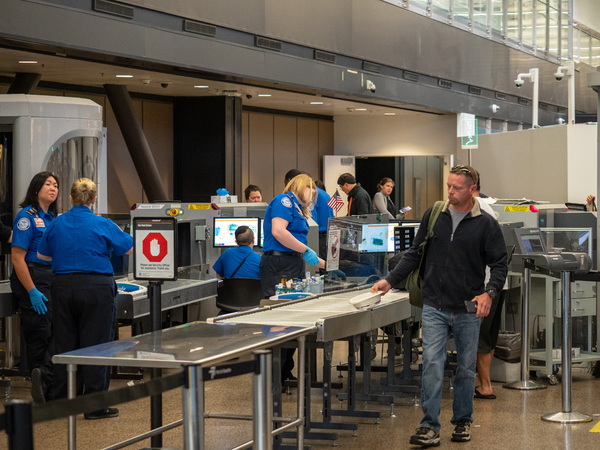American View: How to Recognize the Dead Cat on the Dining Room Table

The sun came up in America today, which meant we got another tempest-in-a-teapot drama to distract us from all the real, guillotine-worthy problems plaguing our society. This last week’s kerfuffle was the publication of allegedly “sleezy” photos of atrocious politician Madison Cawthon. Politico secured some happy snaps of the loathsome congress-critter bedecked in women’s lingerie taken at some sort of public soiree. For a public figure who claims to uphold “traditional values” and accused his colleagues in Washington of engaging in exactly this sort of activity (albeit with cocaine and … um … adult activities), Politico’s photo drop suggested the wannabe firebrand was exhibiting staggering levels of hypocrisy.
Not that saying one thing and doing another would be anything new for the repugnant representative. Last Week Tonight’s host recently reminded viewers of some of Mr. Carthorn’s more egregious falsehoods. “The fact is though, Cawthorn’s record with the truth has always been unrelentingly bad,” said Jon Oliver. “He implied the car crash that left him partially paralyzed derailed his plans to attend the U.S. Naval Academy, even though his application had already been rejected before the crash. He frequently claimed to be training for the Paralympics, which was news to actual Paralympians like Amanda McGrory, who pointed out he’s not even in the official registry for Paralympians, which you would have to be in order to compete.”
So, no. Discovering that another click-addicted bottom feeder had engaged in some bald-faced duplicity to score political points doesn’t qualify as news, let alone as a “scandal.” While good for a few laughs, the “story” wasn’t worth the airtime it took away from Russia’s crimes against humanity in Ukraine, Texas’s multi-billion dollar political stunt on the Mexican-American border, or Florida’s government going to war with private businesses over political ideology. We have far more important topics to pay attention to; another vacuous story that suggested (but didn’t prove) that a well-established liar might be lying again barely deserved a passing sneer.
I’ll go a step further and argue that even a contemptuously self-righteous dretch like Cawthorn deserved the benefit of the doubt over his seemingly salacious cross-dressing photos. First because dressing awfully isn’t illegal. Second because anyone can wear a terrible costume. Third, because you can see far bawdier (and more creative) getups every Saturday night at a midnight showing of The Rocky Horror Picture Show. So what if the dishonourable “gentleman” was wearing a bra while downing an adult beverage? That was a more wholesome and less objectionable use of his personal time than planning an insurrection.
To be clear, I have zero empathy for the man. I look forward to the wheels of justice finely grinding him into a foul paste for his misdeeds. That said, I recognize that fragments of stories that can be taken the wrong way always will be. It’s Murphy’s Law for gossip fragments.
One of my many adventures with this phenomenon came just after 9.11. The federal government demanded immediate improvements to airport security and mobilized the National Guard to help restore the public’s confidence in commercial air travel. I was activated to do public affairs work for the airport security mission.

Before the first cohort deployed to DFW International Airport in October 2001, I was tasked to brief the soldiers of 3rd Brigade, 49th Armored Division how to interact with the media. This was an all-day affair; my 45-minute preso was sandwiched between a dozen other “pre-mobe” mandatory briefings. My “driver” and I had to hang out at California Crossing Armory all day.
This was bothersome for my “driver” because he had nothing to drive. Unlike the Army, where there are ground vehicles for everyone, the Air Force doesn’t maintain motor pools like car rental lots. When I was activated, I submitted a request for a government vehicle. There weren’t any to be had on our base, so HQ activated me a driver … but didn’t have any wheels available. So, I had an untrained, unqualified junior enlisted man shadowing me who couldn’t do much beyond taking notes. I also had to use my own car – a ten-year-old, crapped out, BMW sedan – to “make the mission happen.” Not ideal.
So – as any good military story goes – there we were: It was late on a Saturday evening in September 2001 when we finally wrapped up our business at the armory. We’d already put in a 12-hour day and were quite fatigued. We said our goodbyes, hopped in my beat-to-hell Beemer, and got on Luna Road heading towards 348. We had just left the armory when my government cell phone rang.
It was legal in Texas to talk on a mobile while driving back then … but it was stupid to. My non-driving “driver,” SrA Kilgore, [1] took the call and related that HQ had some critical instructions for us … and the caller wanted to talk to me, specifically. Ugh. No BlueTooth to the car radio back then.
If you look at the map, you can see that there was only one place near us to turn off and take a call: a liquor store on the opposite side of the motorway from the armory. That’s what we did. We popped across, pulled into the only spot that was under a streetlight, parked, and took the call. The safe way. The proper military way. By the book. Safe as can be.
That was when the drunk hit us.
It was, fortunately, a very low-speed collision. We were parked, gearbox in neutral, emergency brake on, engine off, in a completely empty car park. At night. Some dingbat must have thought he was queueing up with traffic and drove right into us from behind. Not hard enough to cause either of us serious physical injury; just hard enough to tear the entire back bumper off my car.
I can only imagine what went through the drunk’s mind when he saw two military men in uniform get out of the car he’d just hit. The fellow made a panicked reverse left, then peeled out. Kilgore and I looked at one another, looked at my bumper lying forlornly on the asphalt, and burst out laughing. Then we wedged the bumper in the backseat and drove back to base.
By rights, since my car was damaged during the performance of official government duty, I should have been reimbursed by the military for repairs. That I shouldn’t have been driving my personally owned vehicle for official business in the first place was mitigated by the sad reality of the empty motor pool back at Carswell. The motor sergeant was happy to vouch for me. The problem came when trying to file a claim with the bean counters. Every time I tried to explain what had happened to the Finance staff, they got hung up on where the crash had occurred.

Safety tip for our UK readers: despite the documented fact that 7 out of 10 American adults drink alcohol, we still treat the procurement and consumption of alcoholic beverages like we were back in the Prohibition Era. Just mentioning the act in an American office will sometimes be met with horrified pearl clutching.
“It was at the [so-and-so] liquor store car park where 348 crosses Luna,” I’d say.
“Oh! You can’t go to liquor stores in uniform!” the puritanical bean counter gasped.
“I know that, and we weren’t visiting the liquor store. We parked in the only lot around to take an official call.”
“But you went to a liquor store!” the clerk said.
“I went to the nearest car park and parked. I did not go to, near, or into the liquor store that happened to connect to that empty car park.”
Drawn by the sound of raised voices, a Finance supervisor popped his head into the cubicle. “You can’t go to liquor stores in uniform!” he said.
This exchange repeated endlessly thanks to Murphy’s Law of gossip fragments. No matter how much clarifying context there was, how many witnesses there were, or what the circumstances might have been, the bean counters couldn’t get past the one “taboo” detail in the telling because it blinded them to every other part of the story.
So, yeah. This happens … a lot … in prudish America. If any part of a story might be considered PG-13 rated or worse, people will lose their bloody minds. They’ll gleefully over-focus on the isolated pseudo-prurient element taken out of context and ignore the real story. It’s our way; we seem to be a nation of junior high school dorks who never matured into functional adults. Scratch a “wise American elder,” and you’ll find a sniggering 12-year-old both fascinated and frightened by anything considered “dirty.”
That being the case, I’m inclined to ignore last week’s fake moral panic over the odious representative from North Carolina. The man’s already enough of a disgrace that a few party photos don’t deserve to be blown up into a scandal. They’re not worth it. He’s not worth it.
Why discuss all this? Because Murphy’s Law of gossip fragments applies to business life every bit as much as it does in political and military life. People naturally latch onto blather-worthy conversation hooks and blow them out of proportion as an excuse to trash talk their co-workers. It’s natural and normal (if irritating and unprofessional) behaviour.

Small wonder, then, that so many Americans are terrified of what their kids might learn by getting on the Internet, going to a library, or associating with … *gasp* … foreign people! Why, their kids might discover an entire world out there that isn’t rigidly constructed around the hyper-repressed, lily-white, propaganda film depiction of an idealized 1950s America that never actually existed.
This impedes organisations’ ability to keep projects on track, learn lessons from failure, and identify the root causes of problems. As much as we claim to be mature business professionals, far too many office conversations get derailed by soap opera style manufactured drama. We’re primed not just to believe the worst about our colleagues, but actively crave it. I argue this isn’t necessarily because we’re deplorable people, but because of a universal fault in how we think.
It’s called “negativity bias.” In essence (and I’m quoting here): people “… consider negative information to be more diagnostic of an individual’s character than positive information, that it is more useful than positive information in forming an overall impression. This is supported by indications of higher confidence in the accuracy of one’s formed impression when it was formed more on the basis of negative traits than positive traits.” Put another way, we’re conditioned to place more trust in information that suggest others are somehow bad and to ignore or discount stories or factors that challenge our desire to belief that others are bad.
This is why, I submit, people disproportionately focus on the trivial stories and story fragments that paint others in a damming light and ignore complicated narratives that require nuanced understanding. It’s just not how our brains are wired. Our primitive brains want to make decisions quickly, judge others, and smugly consider ourselves to be somehow “better” than our rivals. It’s not just ego preservation, it’s a way to alleviate our own anxieties. We don’t have to measure up to others’ performance standards if we can discount them as competition based on some moral flaw or failing. See above, re: junior high school dorks.
What do we do to mitigate this self-destructive inherent weakness? Recognize that it exists, first, so we can identify when we and others are affected by it. Then strive to filter out our biased emotional reactions in favour of rational, considered analysis. You know … the hard stuff we don’t do if think we can get away with it.
Also, we need to ignore spicy anecdotes about people we already dislike to keep from being distracted. People who understand a little human psychology, the media hype cycle, and mass communications employ salacious distractions to divert attention from real issues. PM Boris Johnson called is the “dead cat strategy.” Whatever you call it, it works … unless we can recognize it for what it is and overcome our natural desire to embrace it. This applies equally in both in national politics and office politics. If you can’t overcome your brain’s natural bad habits, you’ll find yourself constantly losing sight of what’s truly important. Like focusing on a cynical opportunist’s club shenanigans instead of their efforts to overthrow democracy.
[1] In a departure from my usual practice, this is the fellow’s real name. Kevin Kilgore was a great NCO. He went on to be a professor at Sangmyung University and a talented cartoonist. He deserved far better as a junior airman than getting stuck with a lunatic boss like me.

Keil Hubert
You may also like
Most Viewed
Winston House, 3rd Floor, Units 306-309, 2-4 Dollis Park, London, N3 1HF
23-29 Hendon Lane, London, N3 1RT
020 8349 4363
© 2025, Lyonsdown Limited. Business Reporter® is a registered trademark of Lyonsdown Ltd. VAT registration number: 830519543





